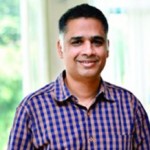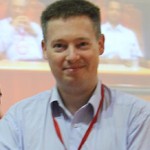 Ganesh Sambasivam, Ph.D.
Ganesh Sambasivam, Ph.D.
CSO & Co-Founder, Anthem Biosciences India
Preclinical Outsourcing to India
The outsourcing segment is witnessing rapid changes with respect to the nature of work outsourced and the location. Cost is the major driver but other considerations such as infrastructure and government policies can also be important drivers for decision making. The last couple of years have been a trying time for all CROs. The global economic meltdown has hit research budgets especially hard. The new challenges facing Contract Research Organizations call for a radically revised approach and a new model that would push the boundaries of this business further and would blur the line between client and vendor further. I believe the term Contract Research Organization (CRO), is a misnomer to begin with (often confused with Clinical Research Organization), has now morphed into a new type of company viz Contract Innovation Services (CIS). Clients are no longer just happy to outsource odds and ends of the development piece but are looking to their vendors for a massive amount of innovation input. This input is increasingly across both the chemistry and discovery domains. This new paradigm calls for CIS companies to develop new platforms, create intellectual propertythat is of service to clients andinnovate processes to meet new found customer expectations.

Jaydeep Unni, Ph.D.
Sr. Project Manager, Robert Bosch Healthcare Systems, Palo Alto, CA
Remote Patient Monitoring – Challenges and Opportunities
Remote Patient Monitoring (RPM) is gaining importance and acceptance with rising number of chronic disease conditions and with increase in the aging population. As instances of Heart diseases, Diabetes etc are increasing the demand for these technologies are increasing. RPM devices typically collect patient vital sign data and in some case also patient responses to health related questions. Thus collected data is then transmitted through various modalities (wireless/Bluetooth/cellular) to Hospitals/Doctor’s office for clinical evaluation. With these solutions Doctors are able to access patient’s vital data ‘any time any where’ thus enabling them to intervene on a timely and effective manner. For older adult population chronic disease management, post-acute care management and safety monitoring are areas were RPM finds application. That said, there are significant challenges in adoption of Remote Patient Monitoring including patient willingness and compliance for adoption, affordability, availability of simpler/smarter technology to mention a few. But experts contend that if implemented correctly Remote Patient Monitoring can contain healthcare expenditure by reducing avoidable hospitalization while greatly improving quality of care.
 Bodo Eickhoff, Ph.D.
Bodo Eickhoff, Ph.D.
Senior Vice-President, Head of Sales and Marketing for Roche Applied Science, Germany
New paths for treatment of complex diseases: target combinatorial drug therapy
Several types of diseases show a complex pathogenesis and require targeted as well as combinatorial drug treatment. A classical example, Tuberculosis, was thought for decades to be managable by triple therapy, however now requiring new therapeutic approaches due to multi drug resistant strains. HIV and AIDS can only be kept under control by combinations of specific, virus-protein targeted drugs, requiring constant monitoring of resistance patterns and modulation of drug combinations during life-long therapy. As a third example, Cancer in all its different variations, requires detailled molecular understanding to enable targeted therapy. New technologies provide more and in depths molecular insights into pathomechanisms and resulting treatment options. However, is there an alternative way to approach complex diseases by holistic models? Can restoring of apoptosis-capabilities of transformed cells be an example of such an alternative path? How do we in future adress major unresolved topics like increasing drug resistance in bacterial infections, lack of anti-viral drugs, treatment of parasite diseases like Malaria, and newly emerging infectious diseases in research and fast translation of these results into diagnosis and treatment?
